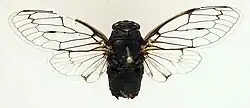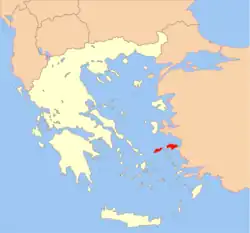Cicadatra icari
| Cicadatra icari | |
|---|---|

| |
| Scientific classification | |
| Kingdom: | Animalia |
| Phylum: | Arthropoda |
| Class: | Insecta |
| Order: | Hemiptera |
| Suborder: | Auchenorrhyncha |
| Family: | Cicadidae |
| Genus: | Cicadatra |
| Species: | C. icari
|
| Binomial name | |
| Cicadatra icari Quartau,Simoẽs and Sanborn, 1998
| |
Cicadatra icari, commonly known as Icarus cicada, is a species of cicada found in Greece, specifically on the islands of Ikaria and Samos.
Etymology
The species name "icari" comes from Icarus.[1]
Size
Measurements taken from apex of crown to tegmina tips in resting position:
- Body length: Male: 29–31 mm ; Female: 29 mm
- Forewing:
- Length: Male: 24–25 mm ; Female: 24 mm
- Width: Male: 10–11 mm ; Female: 11 mm
- Head width: Male: 6–7 mm ; Female: 7 mm
- Mesonotum width: Male: 7–8 mm ; Female: 24 mm[1]
Distribution
Cicadatra icari is endemic to Greece, specifically on the islands of Ikaria and Samos.[1]

Acoustic behaviour
- Frequency range: 5–17 kHz (dominant band)
- Primary peak: Maximum energy at 9.4 kHz
- Secondary peak: Significant energy concentration near 7 kHz
The echeme song occupies a similar spectral range (5–17 kHz) but shows that shifted energy peak to approximately 8.5 kHz and broadband frequency characteristics maintain.[1]
References
- ^ a b c d e Simões, Paula Cristina; Sanborn, Allen; Quartau, José Alberto (January 2013). "Two new species of C icadatra ( H emiptera: C icadoidea) from G reece". Entomological Science. 16 (1): 83–90. doi:10.1111/j.1479-8298.2012.00540.x. ISSN 1343-8786.